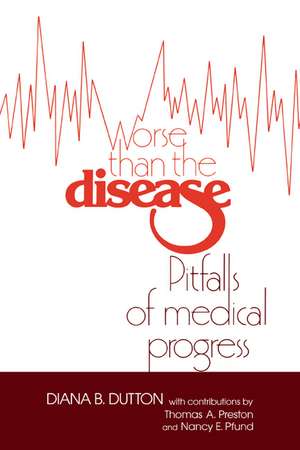Worse than the Disease: Pitfalls of Medical Progress
Autor Diana Barbara Dutton Contribuţii de Thomas A. Preston, Nancy E. Pfunden Limba Engleză Paperback – 28 mai 1992
Preț: 443.66 lei
Nou
Puncte Express: 665
Preț estimativ în valută:
84.90€ • 88.10$ • 70.97£
84.90€ • 88.10$ • 70.97£
Carte tipărită la comandă
Livrare economică 17-31 martie
Preluare comenzi: 021 569.72.76
Specificații
ISBN-13: 9780521395571
ISBN-10: 0521395577
Pagini: 548
Dimensiuni: 152 x 229 x 31 mm
Greutate: 0.73 kg
Ediția:Revised
Editura: Cambridge University Press
Colecția Cambridge University Press
Locul publicării:New York, United States
ISBN-10: 0521395577
Pagini: 548
Dimensiuni: 152 x 229 x 31 mm
Greutate: 0.73 kg
Ediția:Revised
Editura: Cambridge University Press
Colecția Cambridge University Press
Locul publicării:New York, United States
Cuprins
Preface; Acknowledgments; List of abbreviations; Part I. Overview: 1. Introduction; 2. Where are we and how did we get there? Part II. Four Case Studies: 3. DES and the elusive goal of drug safety; 4. The artificial heart Thomas A. Preston; 5. The swine flu immunization programme; 6. Genetic engineering: science and social responsibility Diana B. Dutton and Nancy E. Pfund; Part III. Lessons, Questions and Challenges: 7. Risks and rights; 8. Compensating the injuries of medical innovation; 9. What is fair? Medical innovation and justice; 10. The role of the public; 11. What is possible? Toward medical progress in the public interest; Notes; Index.
Recenzii
'In this book Diana Dutton successfully delineates the hazards of policy-making when professional groups dominate or usurp decision making in the delicate relationship between the scientific constituency and the whole of society. In a skillful and detailed analysis, she portrays the resulting disastrous ill effects of lack of appropriate linkage-science policy-making without public participation … should be read and taken to heart by the scientific community as well as the public to which it is addressed.' The Pharos (Journal of the Alpha Omega Alpha Honor Medical Society)















